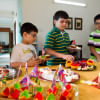How to help kids resist real-life and online peer pressure

When children are young, they crave parental approval. However, as they grow older, they become increasingly concerned with how other teens perceive them. They may develop anxiety about not fitting in or getting excluded. This can have a significant impact on youngsters who yearn to be accepted by their peers.
In today's world, children must be active on two fronts: making sensible choices in real life, and on the World Wide Web, especially on social media. The message in today's social scene may just as well be: "Join us, or else you will be left behind!"
Sometimes, it even goes beyond exclusion to include teasing, ridicule, and outright bullying. And, trying to fit in may lead some children down the path of making decisions that challenge their worth and compromise their very existence.
Encouraging kids to engage in daily physical activities and ensuring they receive the best education are all crucial. Parenting also involves helping children develop the emotional armour to withstand peer pressure without losing themselves along the way.
The art of listening
This is one of the greatest powers a parent can exercise. When your child needs to talk, be there. Drop whatever you are doing, especially put down that phone, and just focus on them. Even if what they have to share is distressing, try not to respond with immediate interruption or overreaction. Your child should feel that you are his/her safe space, supporting rather than judging. Being dismissed or scolded may just leave them never wanting to come talk to you again.
The habit of knowing their lives
Parents should observe their child's social circle closely to know who they are spending time with. Any abrupt change in their demeanour, mood, and appearance can be the first indicator of something being wrong. You should make it a habit to ask questions that need a full answer, such as, "What was the best part of your day?" or "Whom did you hang out with at lunch?"

And this also means knowing about their internet activities. A lot of times, social media is an invisible place where peer pressure grows. Maintain an open conversation about what they are feeling and witnessing on social media, and create a judgment-free zone to discuss it.
The perks of arming with tools, not fear
If adults tell a child to "stay away" or label someone as "bad news," it may only strengthen the child's temptation to look into or act towards the danger. Hence, these need to be empowering words. Teach your children how to say no with confidence, and roleplay with them different situations where they might be pressured to do something they do not want to.
Help them agree on a code word or phrase to use in tough situations, which can be a subtle sign for help.
Remember, confidence is not given to children at birth. Many feel jittery or totally paralytic with peer pressure. They tend to spiral into self-defeating attitudes. So, give them the tools to prep for thick skin, including positive affirmations, acknowledging strengths, and support in pursuing hobbies and interests that exude positive energy.
The significance of imparting family values
Family values can provide a foundation for a child. A very simple value might be family dinners, in which everyone connects over their day and reflects on various topics. As a parent, you should define expectations for technology use and provide an environment where responsibility is expected throughout the day.
Let your child know that you do trust them. When they make good decisions, praise them with positive words. On the other hand, let them know when they do a poor one, and then guide them with love.
Instil in them that a poor decision is not their identity but rather a chance to learn and grow.
The need to help develop self-worth
Having a good aura of self-worth makes one less vulnerable to negative peer pressures. So, make sure to celebrate your child's efforts over perfectionism, teach them compassion, and give them a few nudges for minor victories. Because, after all, you know what is going to protect a child more than a long list of rules? Love and trust, followed by communication and confidence. If those things hold, your child will be less likely to be deluded into taking a negative path due to peer pressure.
Ultimately, the best gift that a parent can give their children is the confidence that their child can be themselves unabashedly. When children feel seen, heard, and supported, they grow and develop the strength to say no to peer pressure with clarity and courage, knowing in their heart that they are worth it.

 For all latest news, follow The Daily Star's Google News channel.
For all latest news, follow The Daily Star's Google News channel. 








Comments